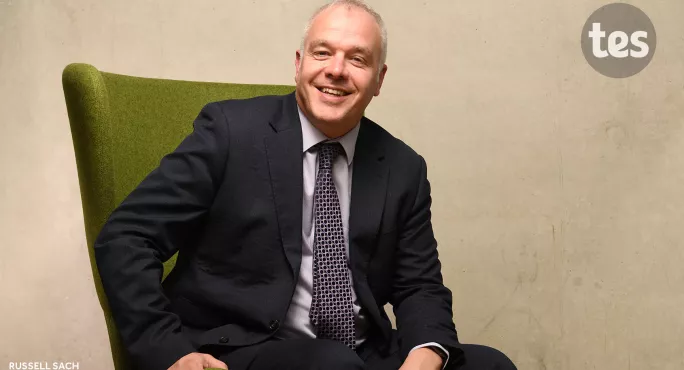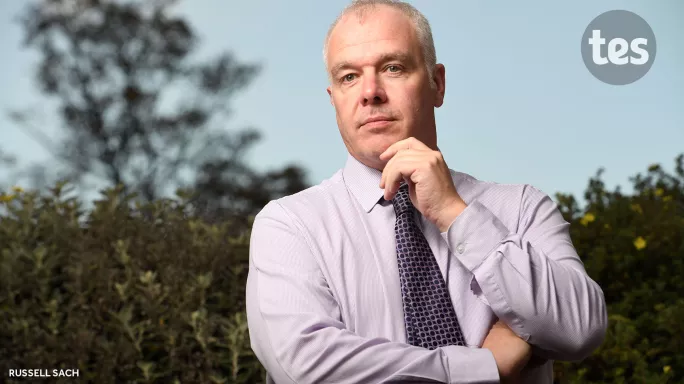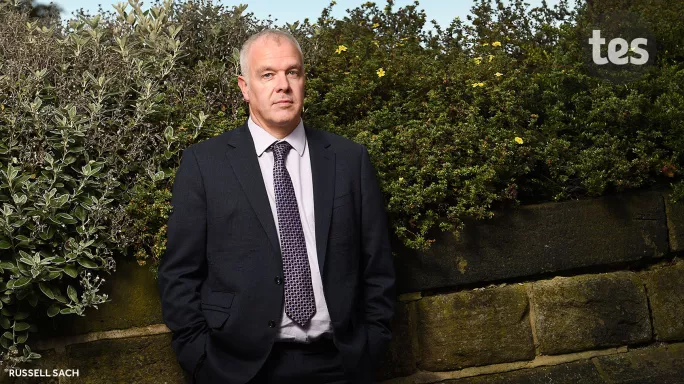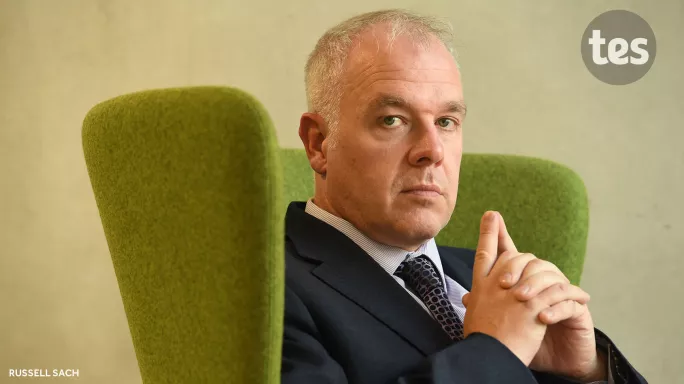
- Home
- How to teach challenging pupils and never exclude them
How to teach challenging pupils and never exclude them

“My first teaching practice was in a really challenging secondary school but it was brilliant because of the nature of the kids that were there.
“Ex-coal mining town, challenging cohort, kids with massive character. I just loved working with those sorts of kids.”
When Dave Whitaker talks about a school having a challenging cohort he does so with a positive sense of excitement. And he describes these pupils as being “at the top end” rather than the bottom.
Exclusive: Northern leaders urged to learn from PRUs to cut exclusions
Profile: Meet the woman making ‘The Difference’ for vulnerable pupils
Background: Why I turned my back on headship to work in a PRU
As the director of learning at Wellspring Trust he is now responsible for an expanding group of special and alternative provision academies with, in his words, “hundreds and hundreds of challenging kids”.
Since it was set up the trust, which also operates 11 mainstream schools in the North of England, has never permanently excluded a pupil.
Now it is helping to support a project that aims to make mainstream schools more inclusive and find ways of dealing with children with challenging behaviour.
Whitaker and the Wellspring Trust are backing The Difference programme, which is just about to launch a scheme in the North allowing aspiring mainstream school leaders to gain valuable experience of pupil referral units. They will get to work in PRUs for two years to learn how they support their pupils before going on to mainstream school leadership roles.
Kiran Gill, founder of The Difference, hopes it will support leaders in schools to find ways of being more inclusive. Whitaker is a big supporter of the programme. He believes it should be funded by government because he says some pupils are not having their needs met by the way behaviour is managed in some mainstream schools.
And it is meeting those needs, of challenging pupils, that Whitaker says has been his most rewarding work in the classroom.
“Saying kids are challenging is not writing them off,” he says. “It’s the other way round. I love them. Loved working with them. It’s the best job. The challenge is managing their personalities and their characters.”
He recalls how at both his first placement at the Priory School in Barnsley and his first job at Kingstone School in the same South Yorkshire town that he had found his calling.
“When I had that job in Kingstone, I was teaching 30 kids in a class. You very rarely had a teaching assistant and there was no behaviour structure or system that was there to rescue you. When the door closed behind you you were on your own. You didn’t have a behaviour structure to support you.
‘I had to earn the respect of the class’
“What I had to do is earn the respect of the class, teach really, really well. And if those kids were running around on the desks I had to get them down on my own with my personality and they needed to want to get down off the desks.”
He describes the experience as being daunting but he also believes it is where he learned what he considers is essential to managing behaviour - building up relationships with the pupils. And he worries that some of this is being lost in mainstream education.
“What happens now is that if a kid runs around on the desk there is a button you can press and someone comes and takes the kid out. At the risk of sounding controversial I think we are at risk of deskilling.”
You can tell this is an argument he has had before because he then addresses what critics might say.
“I am not saying kids should have to put up with certain stuff. I am not saying that at all. I am not saying that teachers should have to put up with certain stuff. I am absolutely not saying that. But I learned back then how to manage a classroom by having that door closed on me and having an hour with them.
“You use relationships, you use rigour, you use routine, you use humour, you use warmth, you use all of that so that the kids are on your side and wanted to learn.
“I owed them that. I owed them good lessons and good quality teaching but when they didn’t want to do it, I had to get them to want to do it and do it for me and that for me is where my relational-based behaviour management started.”

Whitaker grew up in Pontefract in West Yorkshire, and has spent his working life teaching in Barnsley, a once industrial town now most famous for its mining past. He describes himself as having “an angle” on working with children who might struggle at school because he was a disaffected pupil himself.
“I was not disaffected in terms of being massively challenging - it just didn’t rock my boat. When people say can you remember those brilliant teachers you had, I can safely say that I didn’t have one and I didn’t have anyone inspiring me as I went through school.”
Whitaker went on to higher education where he describes himself as having fun and making lifelong friends. But he didn’t have a clear idea of what to do next.
And while he never knew exactly where a degree in geography and outdoor pursuits would take him, it is fair to say he didn’t have in mind working for a water utility company mapping out sewers across Yorkshire.
“Because I did geography people thought I could read maps but it was not exactly inspiring and it made me realise I needed to do something different with my life.”
So Whitaker returned to education, did a PGCE at Sheffield University and found his calling. After starting work at Kingstone School he quickly became involved in pastoral support work and leading the school’s work in special needs.
From there he moved into the special educational needs sector, joining Springwell School as deputy head as it changed from being a PRU to a special school for pupils with social, emotional and mental health needs.
Then, as the government began rolling out the academies programme, Springwell decided to go it alone as an academy trust.
“We thought really hard about it and we were really inventive with the name Wellspring,” Whitaker says. “We just switched the name Springwell around.
‘We didn’t want to be like a hero school’
“We didn’t want the trust to have the same name as the founder school. We felt we didn’t want to be like a hero school.
“We didn’t want to do that thing where the trust carries the name of the first school because it’s not fair on all the other schools that are in the trust. We wanted equal partners and what I would say now is how much I value the leaders of our alternative provision, special schools and our mainstream schools. They are the heartbeat of our trust.”
Today that trust runs 22 schools, including 11 alternative or special schools, and has supported 80 more mainstream school across the country. As it happens Springwell was not even the first school in the trust. A complicated PFI deal held up academy conversion and meant that Wellspring’s first school was actually at a mainstream primary school - the Forest Academy in Barnsley.
Its head Mark Wilson became the chief executive of the trust and Whitaker, who was the head of Springwell School, became executive principal. As the trust has grown he has become director of learning responsible for the 11 special and alternative provision schools .
He is keen to stress that the same ethos runs through all of its schools, that of having “unconditional positive regard” for the pupils.

Whitaker takes great pride in explaining how Wellspring has never permanently excluded a pupil, and how a mainstream secondary it took on in Grimsby is “on-rolling pupils” who have previously been electively home-educated.
Inclusion is fundamental to the way he sees education.
“What you have got to do is try to work out what they are doing and get them to do it in a different way,” he says. “Not by punishing them - it breeds resentment, it damages relationships. You tell me a school where detentions work for the majority of children who are having them.
“You show me a school where fixed-term exclusions are not always the same kids getting excluded and racking them up time and time again.
“You look at detention statistics for a secondary school and it will be the same kids week after week who don’t bring the pen, don’t bring the pencil, don’t do their homework. But what we have got to think is if detention is an intervention, interventions are supposed to work.
“If you have an intervention that was aimed at teaching children how to write and six months later they weren’t learning how to write you would scrap that intervention, and yet we have an intervention in the detention system which is embedded in thousands of schools that clearly doesn’t work for a big chunk of children, but we still put them through.”
As such Whitaker is on one side of an increasingly polarised debate about how behaviour should be managed in schools. But he takes issue with the idea that his schools are soft or do not have high expectations.
“Being unconditionally positive and not being punitive does not mean you do not have high expectations,” he says.
“I am expecting them to behave well even though you are not going to get something for it, and I am not going to punish you if you don’t. I want you to do it because you know it’s the right thing to do. We have to teach them that.
“Now, I am not saying our schools don’t use rewards and I am not saying across the trust we don’t have detentions but it is not the be all and end all and we have not got behaviour systems that revolve around it.”
He is keen to point out that the approach he promotes is not just a nice theory, it actually works for Wellspring pupils.
“At the two Springwell schools in Barnsley, one is alternative provision, one is a SEMH (social, emotional and mental health) special school. They have both got “outstanding” for behaviour. They both use relational-based practice.
“They don’t have a punitive or reward-based approach and yet the behaviour is judged “outstanding” by Ofsted in both of them.”
Whitaker believes that this approach needs more recognition nationally.

“What I am saying is that a lot of the behaviour programmes that are out there that are championed and advocated don’t necessarily do the work that schools are crying out for with some kids, and therefore their only option is exclusion.
“Some schools have systems that say, ‘the children have to learn how to respond’.
“I would argue that is OK for a lot of children but there are those children who have had adverse experiences, cognitive impairment, they behave in a different way so therefore you cannot have the same behaviour system.
“If you have two children at two different stages of reading you do not give them the same book. But we don’t do always do that in behaviour.”
Drivers of exclusion
It is worth pointing out that with just one mainstream secondary, Wellspring is not measured in accordance with Progress 8 scores in the same way that many schools criticised for high exclusion rates are. Whitaker accepts this wholeheartedly, and says this is why there needs to be a culture change in terms of how schools are held to account.
He believes the accountability system, a lack of funding and a lack of expert knowledge in dealing with challenging pupils is driving exclusion.
His trust hopes to be able to do something about the latter.
“What we are is saying let us support schools for that top end of children that sometimes you run out of ideas with.”
Dave Whitaker will be speaking at The Difference IncludED conference in Sheffield on 9 November, which will explore how schools can be become more inclusive
CV: Dave Whitaker
- Educated at Hemsworth High in Hemsworth, West Yorkshire
- Read geography and outdoor pursuits at Bedford College of Higher Education
- PGCE at Sheffield University.
- Teacher at Kingstone School in Barnsley
- Headteacher at Springwell School, Barnsley
- Executive principal at Springwell Special Academy and Springwell Special Alternative Academy, Barnsley
- Director of learning , Wellspring Trust
Register with Tes and you can read five free articles every month, plus you'll have access to our range of award-winning newsletters.
Keep reading for just £4.90 per month
You've reached your limit of free articles this month. Subscribe for £4.90 per month for three months and get:
- Unlimited access to all Tes magazine content
- Exclusive subscriber-only stories
- Award-winning email newsletters
You've reached your limit of free articles this month. Subscribe for £4.90 per month for three months and get:
- Unlimited access to all Tes magazine content
- Exclusive subscriber-only stories
- Award-winning email newsletters



